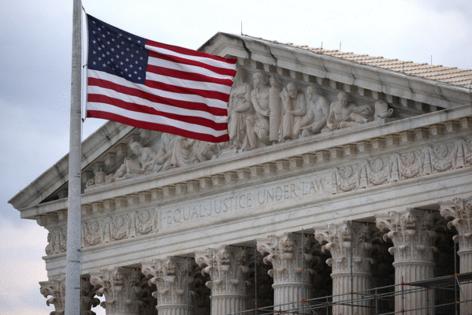Stephen L. Carter: Supreme Court's rulings aren't White House 'wins'
Published in Op Eds
Commentators keep pointing to the Trump administration’s Supreme Court “wins” over the past several days in cases involving the whirlwind of his executive orders, but in legal terms there’s a lot less to the victories than meets the eye.
Friday’s decision allowing the Department of Education to end $65 million in grants was really about the venue where the lawsuits should be brought. Tuesday’s ruling that the government can proceed with forced deportations of alleged gang members arrived with safeguards that the administration sought to deny. The real news shouldn’t be which party prevailed but what the justices actually said.
First, the grants. According to the Trump administration, the agencies that sued the Education Department for canceling grants filed their actions in the wrong court. The grants in question were previously approved under the Teacher Quality Partnership and the Supporting Effective Educator Development programs. The termination letters placed the decision principally on the grounds that the grants were funding DEI and other “unlawful” initiatives. The plaintiffs argued that whether or not the Trump administration shares the priorities of its predecessors is beside the point. The grants had already been awarded; the department and the grantees had signed on the dotted line. The government breached the contract.
The administration’s response is that even if all this is true — if the plaintiffs are, in fact, entitled to damages for breach of contract — the lawsuits should not have been filed in federal district court. The government argued they should have been filed in the Court of Federal Claims, which has exclusive jurisdiction over contract actions against federal agencies. A majority of the justices agreed, overturning the trial court’s restraining order on basically this ground. Justice Ketanji Brown Jackson’s thoughtful dissent argued that a federal district court can hear a challenge to what amounts to a change in policy, and in any case, there was no emergency justifying the majority’s decision to allow the Education Department to “jump the line” rather than moving through the usual process of trial and appeal.
Whichever side you might think is right, the important point is that the Supreme Court did not hold that the Trump administration is free to abrogate its contracts because it happens not to like DEI. The ruling was only that the suits were filed in the wrong place. It’s true that in the Court of Federal Claims the wheels of justice might indeed grind slowly. But that’s where every other plaintiff has to go to resolve assertions that the feds have breached a contract.
And speaking of the slowness of justice, let’s consider for a moment the Trump administration’s enthusiasm for instant deportations, on which the Supreme Court ruled on Tuesday. Here, too, the headlines seem not to have the court’s decision quite right.
Critics have argued, among other things, that the Alien Enemies Act is an outdated and rarely used statute. Here, I largely agree with Harvard legal scholar Jack Goldsmith, who wrote of the dispute that the age of a statute “is irrelevant to the authority it confers.” Goldsmith, no fan of Trump’s approach to questions of legality, further argues that the merits of this particular exercise of presidential power under the Alien Enemies Act are trickier than much of the rather superficial media coverage suggests.
But the question of whether the administration has the power to deport those immigrants it considers dangerous is distinct from whether that power can be exercised summarily. A majority of the Supreme Court said no. In particular, the justices went back almost 80 years to find a precedent for the proposition that in a case involving summary deportation, the target has the right to a court hearing on whether he or she “is in fact an alien enemy fourteen years of age or older.”
Thus, those marked by the administration for removal must be given the opportunity to challenge the factual basis of their deportations. The justices ruled that those challenges should be heard in Texas not Washington, but the key is that the targets of the sweeping deportation orders have the right to fight them. Ironically, had the Trump administration chosen from the beginning to allow some semblance of due process, it would not now find itself in the legally and morally ridiculous position of arguing that an innocent deportee swept up by accident has no recourse but to remain in a Salvadoran prison. Perhaps the hearings to come will weed out others who should have been exempt in the first place. Yes, the wheels will grind slowly, but here that’s surely to the good. It’s in the rush to action that errors are most likely to be made.
To be sure, there are other issues at stake in the cases, regarding when a temporary restraining order can be appealed (old rule: almost never; new rule: almost sometimes); and how the Supreme Court should treat cases filed on its emergency docket rather than through the usual appellate process (old rule: use rarely; new rule: hey, this is fun!); and under which circumstances federal trial judges can issue injunctions covering the entire country (old rule and new rule: oops, there is no rule). Those disputes might seem technical and lawyerly, but given the endless lawsuits predictably sparked by the Trump administration’s endless string of orders, they’re likely to prove important indeed.
Whatever happens going forward, let’s all keep our eyes not on which side “wins” but on what the courts actually say.
____
This column does not necessarily reflect the opinion of the editorial board or Bloomberg LP and its owners.
Stephen L. Carter is a Bloomberg Opinion columnist, a professor of law at Yale University and author of “Invisible: The Story of the Black Woman Lawyer Who Took Down America’s Most Powerful Mobster.”
©2025 Bloomberg L.P. Visit bloomberg.com/opinion. Distributed by Tribune Content Agency, LLC.



























































Comments